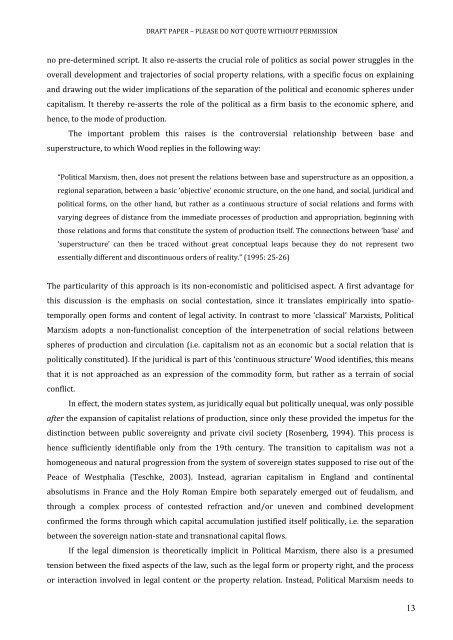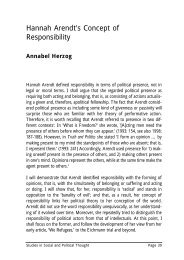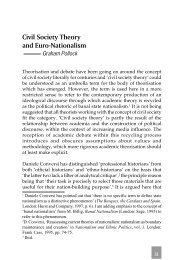Historical Materialism and International Law - University of Sussex
Historical Materialism and International Law - University of Sussex
Historical Materialism and International Law - University of Sussex
Create successful ePaper yourself
Turn your PDF publications into a flip-book with our unique Google optimized e-Paper software.
DRAFT PAPER – PLEASE DO NOT QUOTE WITHOUT PERMISSION<br />
no pre-determined script. It also re-asserts the crucial role <strong>of</strong> politics as social power struggles in the<br />
overall development <strong>and</strong> trajectories <strong>of</strong> social property relations, with a specific focus on explaining<br />
<strong>and</strong> drawing out the wider implications <strong>of</strong> the separation <strong>of</strong> the political <strong>and</strong> economic spheres under<br />
capitalism. It thereby re-asserts the role <strong>of</strong> the political as a firm basis to the economic sphere, <strong>and</strong><br />
hence, to the mode <strong>of</strong> production.<br />
The important problem this raises is the controversial relationship between base <strong>and</strong><br />
superstructure, to which Wood replies in the following way:<br />
“Political Marxism, then, does not present the relations between base <strong>and</strong> superstructure as an opposition, a<br />
regional separation, between a basic ‘objective’ economic structure, on the one h<strong>and</strong>, <strong>and</strong> social, juridical <strong>and</strong><br />
political forms, on the other h<strong>and</strong>, but rather as a continuous structure <strong>of</strong> social relations <strong>and</strong> forms with<br />
varying degrees <strong>of</strong> distance from the immediate processes <strong>of</strong> production <strong>and</strong> appropriation, beginning with<br />
those relations <strong>and</strong> forms that constitute the system <strong>of</strong> production itself. The connections between ‘base’ <strong>and</strong><br />
‘superstructure’ can then be traced without great conceptual leaps because they do not represent two<br />
essentially different <strong>and</strong> discontinuous orders <strong>of</strong> reality.” (1995: 25-26)<br />
The particularity <strong>of</strong> this approach is its non-economistic <strong>and</strong> politicised aspect. A first advantage for<br />
this discussion is the emphasis on social contestation, since it translates empirically into spatiotemporally<br />
open forms <strong>and</strong> content <strong>of</strong> legal activity. In contrast to more ‘classical’ Marxists, Political<br />
Marxism adopts a non-functionalist conception <strong>of</strong> the interpenetration <strong>of</strong> social relations between<br />
spheres <strong>of</strong> production <strong>and</strong> circulation (i.e. capitalism not as an economic but a social relation that is<br />
politically constituted). If the juridical is part <strong>of</strong> this ‘continuous structure’ Wood identifies, this means<br />
that it is not approached as an expression <strong>of</strong> the commodity form, but rather as a terrain <strong>of</strong> social<br />
conflict.<br />
In effect, the modern states system, as juridically equal but politically unequal, was only possible<br />
after the expansion <strong>of</strong> capitalist relations <strong>of</strong> production, since only these provided the impetus for the<br />
distinction between public sovereignty <strong>and</strong> private civil society (Rosenberg, 1994). This process is<br />
hence sufficiently identifiable only from the 19th century. The transition to capitalism was not a<br />
homogeneous <strong>and</strong> natural progression from the system <strong>of</strong> sovereign states supposed to rise out <strong>of</strong> the<br />
Peace <strong>of</strong> Westphalia (Teschke, 2003). Instead, agrarian capitalism in Engl<strong>and</strong> <strong>and</strong> continental<br />
absolutisms in France <strong>and</strong> the Holy Roman Empire both separately emerged out <strong>of</strong> feudalism, <strong>and</strong><br />
through a complex process <strong>of</strong> contested refraction <strong>and</strong>/or uneven <strong>and</strong> combined development<br />
confirmed the forms through which capital accumulation justified itself politically, i.e. the separation<br />
between the sovereign nation-state <strong>and</strong> transnational capital flows.<br />
If the legal dimension is theoretically implicit in Political Marxism, there also is a presumed<br />
tension between the fixed aspects <strong>of</strong> the law, such as the legal form or property right, <strong>and</strong> the process<br />
or interaction involved in legal content or the property relation. Instead, Political Marxism needs to<br />
13
















